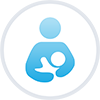Sleeping in the third trimester
Pregnancy | | Marley Hall
Getting enough sleep during pregnancy can be a challenge, especially in the third trimester. Sleep in pregnancy is a bit of a paradox; whilst we know the importance of getting enough sleep during pregnancy, it often comes hand in hand with many sleep issues, meaning that often, adequate rest is not achieved. With a growing belly, frequent trips to the bathroom, and other discomforts, it’s no wonder many pregnant women find it hard to get a good night's rest.
This guide will help you understand how sleep changes during the third trimester, why it's essential, and offer tips and recommended sleeping positions to help you rest better.
How sleep changes in the third trimester
As you enter the third trimester, your sleep patterns may shift. You might find yourself waking up more often during the night due to the following:
- Increased need to urinate - Your growing baby puts pressure on your bladder.
- Discomfort - Back pain, leg cramps, and heartburn become more common.
- Vivid dreams - Hormonal changes can lead to more intense and vivid dreams.
- Shorter sleep cycles - You may spend less time in deep sleep and more in lighter stages of sleep.
Why sleep is important in pregnancy
Good sleep is crucial for both you and your baby during pregnancy. The body needs adequate rest for the healthy development of the baby, and to ensure you have enough energy to keep you well. Sleep helps your body recover and maintain a healthy immune system. Some researchers also believe that limited sleep may have an impact on developing blood pressure problems during pregnancy. Quality sleep ensures optimal blood flow to the placenta, supporting your baby’s growth and development.
Emotional wellbeing is important during pregnancy, and a lack of sleep can contribute to feelings of low mood and depression
Sleeping in the third trimester tips
Everyone will find that different things may help them relax and enable a better night’s sleep, but here are some ideas that you may find beneficial:Everyone will find that different things may help them relax and enable a better night’s sleep, but here are some ideas that you may find beneficial:
- Relaxing bedtime routine - Establishing a calming bedtime routine can signal to your body that it’s time to wind down. Consider incorporating a warm bath and a calming book or audiobook.
- Pregnancy yoga - Pregnancy yoga is an excellent way to relieve tension and promote relaxation. Gentle stretches can help ease discomfort and improve sleep quality. Focus on poses that target lower back pain and hip discomfort.
- Limiting screen time - Electronic devices emit blue light, which can interfere with your body’s natural sleep-wake cycle. To improve your sleep, turn off all electronic devices at least an hour before bed. Create a restful environment by making your bedroom a screen-free zone and leaving electronics outside of the bedroom.
- Hypnobirthing - Hypnobirthing techniques can help you relax and prepare for labour. Some of the techniques that are taught in a hypnobirthing course may also help with sleeping such as guided meditations and breathing exercises.
- Use a pregnancy pillow – think about investing in a pregnancy pillow, not only will this aid a more restful night’s sleep, some can even be used as a nursing pillow too. Pregnancy pillows are designed to support the changing shape of your body as your pregnancy progresses. They come in a range of shapes, sizes and materials, so you should be able to find one that suits you. To help you choose the right pillow, you can read our pregnancy pillows guide.
Third trimester sleeping positions
Getting into a comfortable position can be challenging as the belly grows during the third trimester. If you are a belly sleeper, you’ll probably find this more uncomfortable as the weeks go by. Sleeping flat on your back in the third trimester isn’t recommended as the weight of the uterus can compress the vena cava, a major blood vessel that runs from your heart. This can potentially reduce blood flow to the baby and cause dizziness.
The optimal third trimester sleeping position is laying on your side, preferably the left side. We move around a lot during nighttime sleep, so if you wake up and find yourself sleeping on your back, don’t panic, just roll back over to your side. Laying on your left side in the third trimester can help to enhance blood flow to the placenta, and can help to reduce pressure on your liver and kidneys, lowering the chance of swelling in your ankles, feet and hands.
Placing a pregnancy pillow between your knees when you sleep can be a game changer. Here’s how it can help:
- Support for the belly - Helps support the weight of your growing belly.
- Relieves pressure - Reduces pressure on your back and hips by aligning your body.
- Improves comfort – Promotes the recommended side sleeping position
If you are able to spend time at home or on maternity leave in the final weeks of pregnancy, take the opportunity to have naps where possible during the day. You’ll likely be feeling exhausted, and this can help, particularly if you are not getting enough at night.
Navigating sleep during the third trimester can be challenging, but with the right strategies, you can work towards improving your sleep quality. Establishing a relaxing bedtime routine, incorporating pregnancy yoga, avoiding electronics, and using hypnobirthing techniques can all contribute to better sleep. Additionally, adopting the recommended side-sleeping positions with the help of a pregnancy pillow can enhance your comfort and ensure you get the rest you need.


